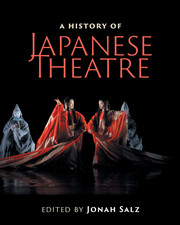Book contents
- Frontmatter
- Contents
- List of figures
- List of tables
- Contributors
- Contributors’ biographies
- Foreword
- Acknowledgments
- Note on Japanese terms
- List of abbreviations
- Timeline
- Editor's introduction
- I Traditional theatres
- Preface to Part I Japanese civilization arises
- II Modern theatres
- Preface to Part II
- III Arcs and patterns
- IV Theatre architecture
- Preface to Part IV Evolution of Japanese theatre architecture
- V Theatre criticism
- VI Intercultural influences
- 22 Seven stages of Shakespeare reception
- 23 Traditional training internationally
- 24 Intercultural theatre: fortuitous encounters
- Interlude Early influence from Europe
- Interlude Asian energy versus European rationality: interview with Ninagawa Yukio
- Epilogue: Frozen words and mythology
- Further reading
- Index
Interlude Asian energy versus European rationality: interview with Ninagawa Yukio
from VI - Intercultural influences
Published online by Cambridge University Press: 05 July 2016
- Frontmatter
- Contents
- List of figures
- List of tables
- Contributors
- Contributors’ biographies
- Foreword
- Acknowledgments
- Note on Japanese terms
- List of abbreviations
- Timeline
- Editor's introduction
- I Traditional theatres
- Preface to Part I Japanese civilization arises
- II Modern theatres
- Preface to Part II
- III Arcs and patterns
- IV Theatre architecture
- Preface to Part IV Evolution of Japanese theatre architecture
- V Theatre criticism
- VI Intercultural influences
- 22 Seven stages of Shakespeare reception
- 23 Traditional training internationally
- 24 Intercultural theatre: fortuitous encounters
- Interlude Early influence from Europe
- Interlude Asian energy versus European rationality: interview with Ninagawa Yukio
- Epilogue: Frozen words and mythology
- Further reading
- Index
Summary
Internationally acclaimed theatre director Ninagawa Yukio (1935–2016) has staged countless productions in Japan since the late 1960s, as well as internationally (see p. 492, Spotlight 22.2). Born in Saitama, near Tokyo, he aspired to become a painter, but gave up this ambition at the age of 20 in order to become a stage actor, later choosing to focus on directing. As a proponent of the anti-establishment Little Theatre movement (shōgekijō undō), he cofounded the Gendaijin Gekijō (Contemporary People's Theatre) in 1967, directing Shimizu Kunio's Shinjō afururu keihakusa (Sincere frivolity) in 1969. The company was disbanded in 1971, but in the following year he established the Sakura-sha (Cherry Blossom Company), which lasted until 1974, where he directed avant-garde plays by Shimizu and others. Soon after came a major turning point in his career: critical accolades for his debut in the commercial theatre with his first Shakespearean production, Romeo and Juliet, at the Nissay Theatre in Tokyo's business district and vast Tōhō Theatre. Since then, he has been at the forefront of Japanese theatre, directing a wide range of Japanese and Western classic and contemporary plays. He has served as Artistic Director of Ninagawa Studio, the Saitama Arts Theatre, and Tokyū Bunkamura Theatre Cocoon, and as an Associate Director of Shakespeare's Globe Theatre in London.
A project to direct the entire Shakespearean canon has produced thirty-one to date, several touring overseas. In Britain he has created productions for the Royal Shakespeare Company, the National Theatre, and the Barbican Centre, and in 2006 he established the Saitama Gold Theatre, which works with actors aged 55 and older. In 2009, he established the Saitama Next Theatre, devoted to young actors. A coveted director among new playwrights, and one of the few Japanese directors whose name alone will draw audiences, since the turn of the century Ninagawa has directed annually an astonishing eight plays on average.
I don't believe that there is such a thing as an epoch-making theatre event, but that there are certain changes to theatrical trends in postwar Japan. For those involved in theatre from the 1950s and 60s, Western theatre was always already the ideal model. Some Japanese directors tried to imitate or copy Western styles by going to see productions of Chekhov at the Moscow Art Theatre or productions of Shakespeare in London.
- Type
- Chapter
- Information
- A History of Japanese Theatre , pp. 532 - 535Publisher: Cambridge University PressPrint publication year: 2016



